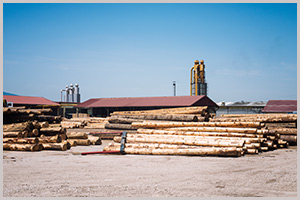
Posted on : Tuesday , 2nd September 2025

Despite the establishment of various ministries and government departments over the years, the development of Kenya's arid and semi-arid lands (ASALs) has remained largely theoretical. However, a new wave of action is emerging as public and private stakeholders unite around a fresh strategy to restore these landscapes placing sustainable wood production and native tree conservation at the center of the effort. ASALs make up over 80% of Kenya’s landmass and are home to the majority of the country’s wildlife and long-standing pastoral communities. Traditionally viewed as barren or unproductive, these regions are now being reframed as untapped opportunities for ecological restoration, climate resilience, and economic development. According to Wycliffe Matika, Africa Program Manager for the International Tree Foundation (ITF), the restoration of ASALs must be viewed as more than just environmental rehabilitation it is a chance to unlock the region’s potential for wood production and long-term livelihood support.
Speaking at the recent ASAL Restoration Roundtable in Nairobi, Matika highlighted the importance of reviving native tree species that have cultural, ecological, and economic significance. He emphasized that many of these trees - such as East African Camphor and Stinkwood are not only part of Kenya’s ecological memory but also valuable sources of quality timber and traditional medicine. ITF’s focus is on preserving and propagating these endangered species, ensuring that they continue to provide timber, fuelwood, and non-timber products vital to rural communities. The role of trees in ASALs goes beyond aesthetics or carbon capture. According to Sylvia Buleti, an associate scientist in agroforestry, diverse native trees are essential not only for biodiversity but also for wood supply chains that are both ecologically responsible and economically viable. Trees provide essential materials such as timber for building, firewood for cooking, and bark or leaves used in traditional medicines.
Buleti emphasized that trees also play a vital role in ecosystem services like stabilizing soil, improving water retention, and creating habitats that sustain pollinators critical to forest regeneration. ASAL landscapes brings back wood producing trees that can directly boost local economies. By reintroducing such trees, communities can benefit from multiple income streams timber, honey, and livestock feed while rehabilitating the land. These efforts align with Kenya’s national target of planting 15 billion trees by 2032, aimed at increasing forest cover from the current 8.83% to over 30%. Mwai Muraguri, Senior Conservator at the Kenya Forest Service (KFS) noted that ASALs are critical to meeting this goal. He emphasized the importance of indigenous species that are resilient and offer not just wood but a range of non-timber forest products such as gums, resins, and medicinal extracts.
Muraguri also highlighted the cultural shift-taking place in some communities, where traditional practices such as taboos against cutting sacred trees are being revived as part of modern conservation strategies. This blend of indigenous knowledge and scientific forestry is helping local populations reclaim ownership of restoration efforts, with wood emerging as both a practical resource and a symbol of resilience. Ultimately, the renewed focus on ASALs represents more than just environmental action. A recalibration of national priorities recognizes wood not only as a product of forests but also as a cornerstone of sustainable development, rural livelihood, and ecological restoration.
Expogroup is a full service exhibition organiser with over eighteen years experience in International.Trade Exhibitions and Events. Our current portfolio includes 20 annual exhibitions from a diverse range of industries being held across the Middle East & Africa.
EXPOGROUP © 1996 - 2025 | Privacy PolicyJoin our mailing list and receive latest news and advice from us in our monthly Newsletter
Yes, I would like to receive Expogroup E-newsletters
